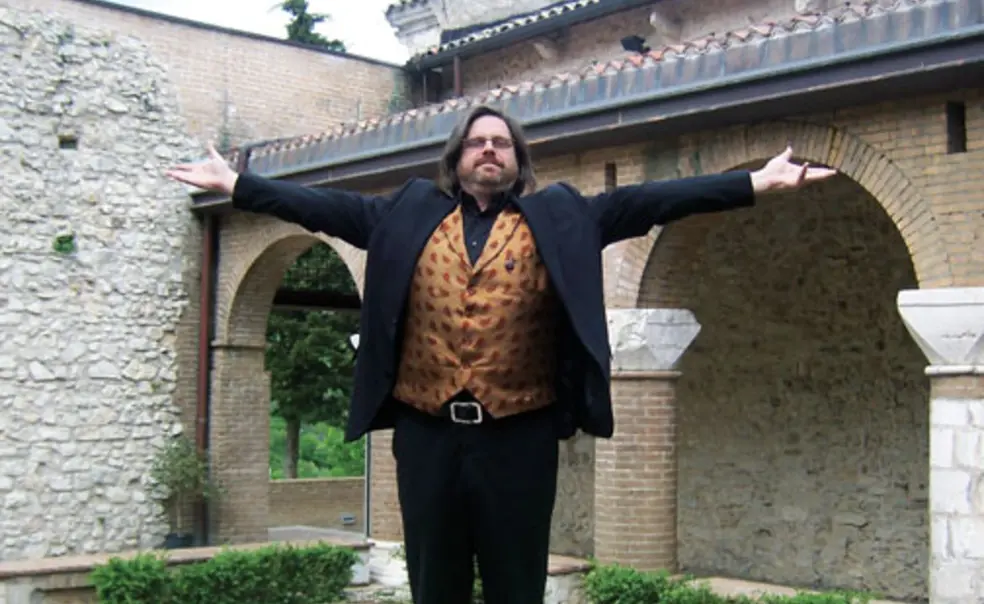Alumni Profile: Christopher Fülling '90, arts thrive in restored Italian monastery
Christopher Fülling ’90 sleeps in a room once used by a monk, and begins each day with communal meditation and exercise. He walks through a cloister on his way to work in a former abbot’s office, and ends most evenings singing Gregorian chant.
Fülling is not a monk, but he is inspired by the monastic lifestyle and historic architecture to create art. With about a dozen musicians and artists, he lives and works in a 14th-century Franciscan monastery-turned-hotel in the medieval town of Labro, Italy, perched on top of a hill more than an hour northeast of Rome. The artists call their community the Art Monastery.
Founded in 2007 by Fülling and Betsy McCall, a visual artist and now his wife, the nonprofit Art Monastery is an experiment in bringing together international artists to collaborate in a communal, simple setting, applying the disciplined, contemplative, and sustainable monastic lifestyle to the creative process.
An experimental musical-theater and opera director and a tenor specializing in Baroque music and Gregorian chant, Fülling came up with the idea for the Art Monastery when he lived in a working German Benedictine monastery for two weeks directing a liturgy reconstruction of a Baroque Easter Vespers, an evening prayer service. “I was so overwhelmed by how focused and supportive and sacred the whole experience was. Life and music seemed so much more palpably meaningful at every moment,” says Fülling. He sought to create that experience for artists year-round.
This is the Art Monastery’s third summer season of performances, and the first in Labro. (The organization operated temporarily out of a bed-and-breakfast in Calvi dell’ Umbria, 45 minutes north of Rome.)
The artists — musicians, dancers, vocalists, performance artists, musical-theater professionals — live rent-free alongside paying hotel guests in former monk cells-turned-hotel-rooms. The monastery provides office space, a church sometimes used for performances, and a large room that has been converted into a theater. In return, the artists premiere their events in the monastery or in Labro’s theaters, churches, or outdoor spaces before touring in nearby towns and beyond. The artists also conduct workshops for hotel guests on topics such as Gregorian chant, painting, and dance.
Each day ends in the monastery’s consecrated church, where the artists sing Gregorian chant. “It’s really fun to have all these radical, crazy performance artists and physical theater people and musicians ... going through this ritual,” says Fülling. “It is really centering and grounding.”
Town leaders and the proprietor of the monastery-hotel, says Fülling, see potential in hosting artists to attract tourists and economic investment to Labro. This summer’s performances will range from American country swing and experimental music to Baroque concerts and live music accompanying outdoor cinema. Recently the artists spent a week training in Gregorian chant and performed vespers for the Bishop of Orvieto in town. Next fall the Art Monastery will create art installations in the monastery and in the town.
One of the Art Monastery’s signatures, says Fülling, is “putting a contemporary twist” to historical material. One project in development, for example, is a Baroque opera based on the Old Testament poem “The Song of Songs” that feels sensual and modern and incorporates Middle Eastern instruments, Baroque vocalists, and belly dance. The Art Monastery was expecting to premiere the opera June 18.
Italy is dotted with abandoned monasteries, and Fülling is working with several Italian cultural organizations, public institutions, and private companies to develop a network of similar monasteries. “We have already accomplished far more than anybody thought we would,” he said.










No responses yet